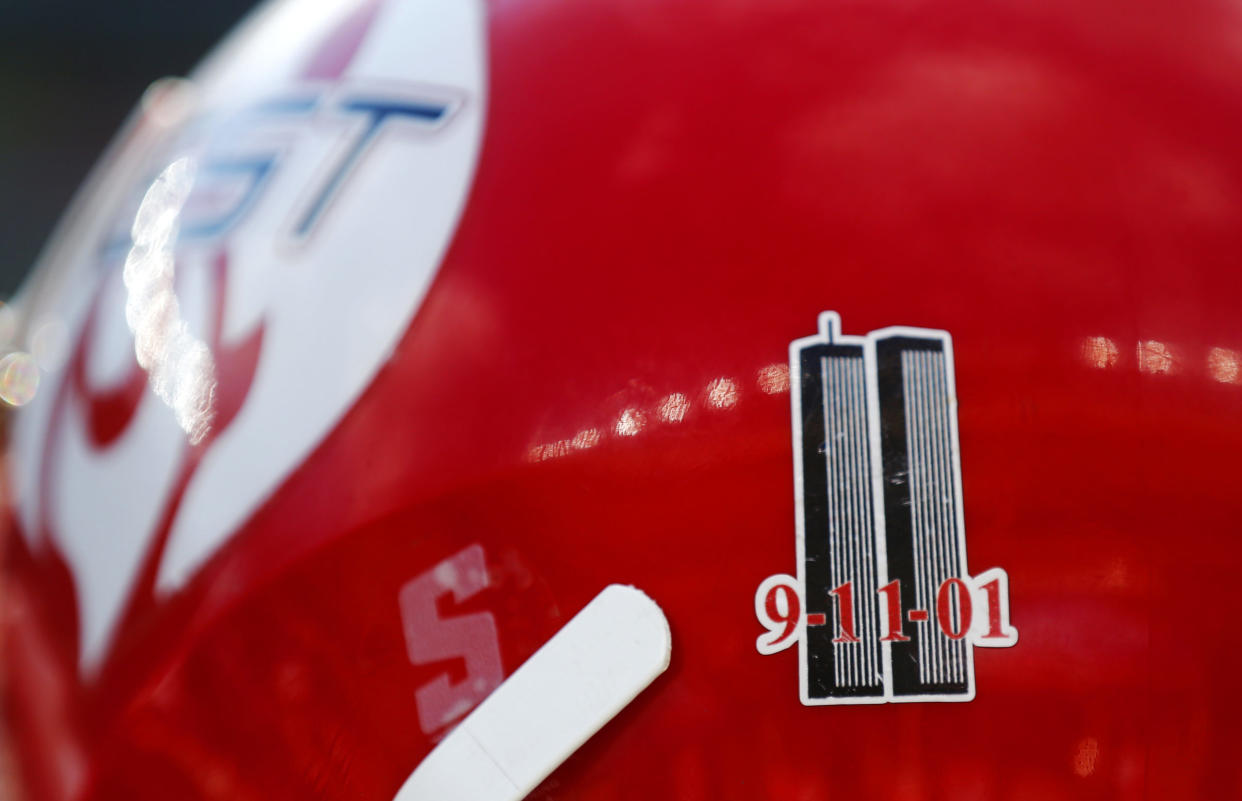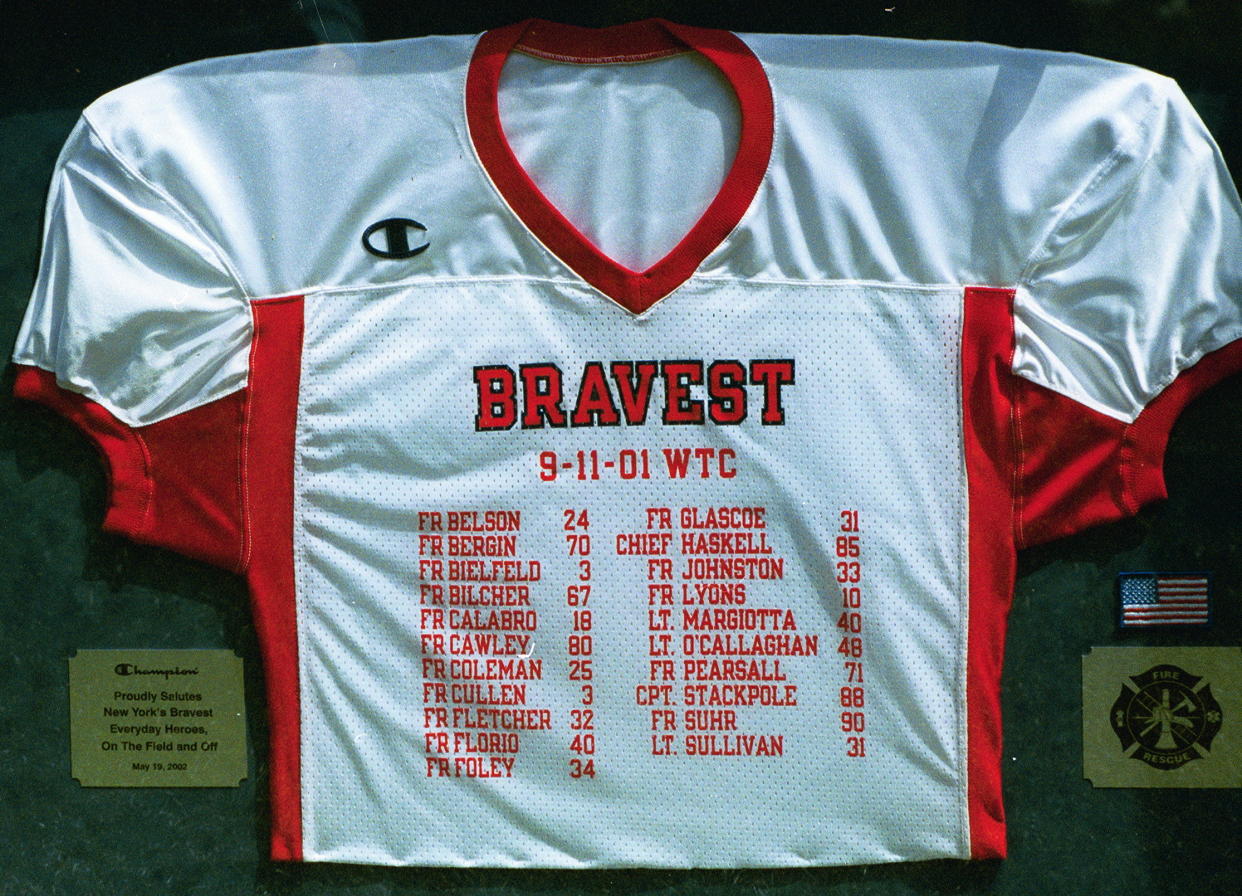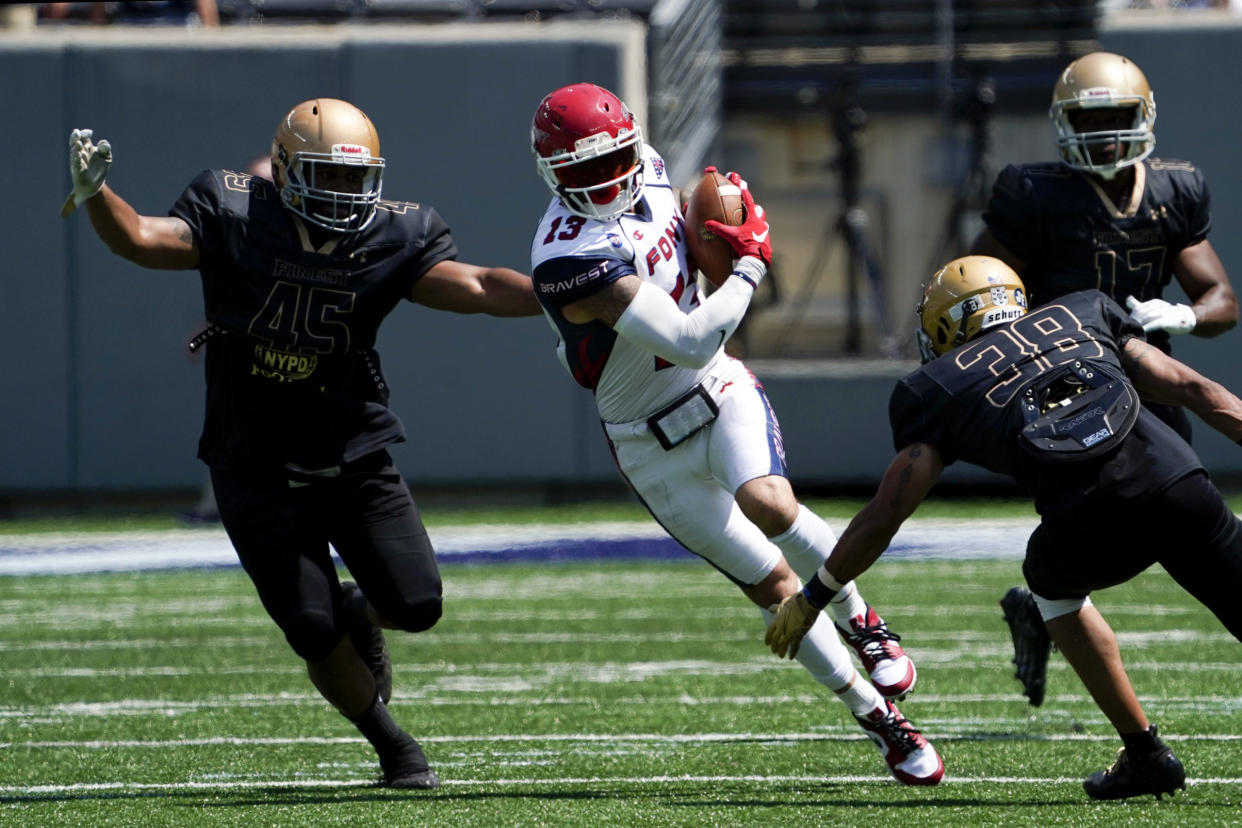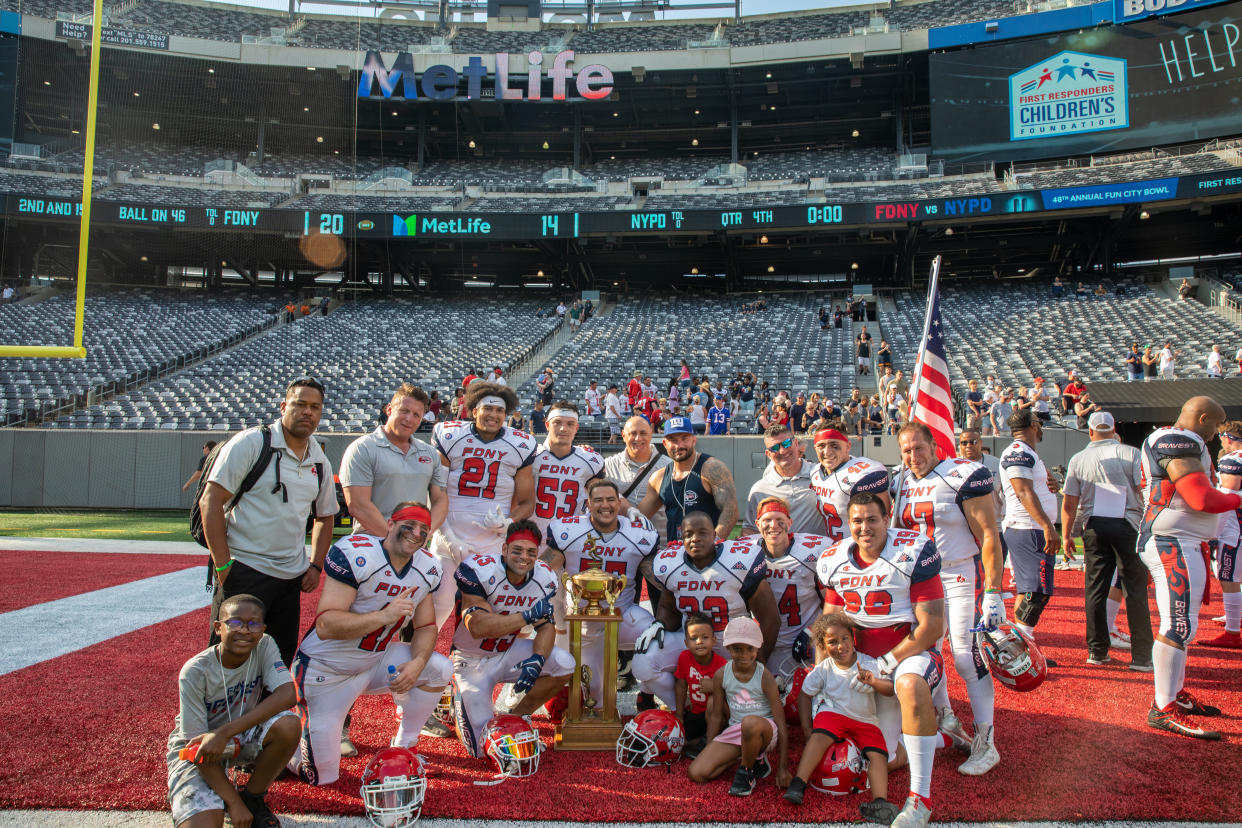20 years after 9/11, FDNY's 'Bravest' football team plays on
On the morning of Sept. 11, 2001, Steve Orr did what he often did when he had an off day from Engine 276 in Midwood, Brooklyn: he hit the gym.
On the morning of Sept. 11, 2021, Steve Orr and the men remaining from Engine 276 will gather first at the station, then at a cemetery on Long Island. They’ll break open the cooler they’ve brought along, crack a few beers, and tell stories of their fallen comrades — tales not just about their heroism in the line of duty, but their triumph on the football field, too.
Football made them teammates. 9/11 made them brothers.

The origins of the Bravest
Orr is a member of a proud, select fraternity within FDNY: the Bravest football team, a semi-pro squad comprised of firefighters from all over the city. Twenty years ago, 9/11 tore a hole in the heart of the FDNY, and the football team wasn’t spared: seven active players and 15 alumni of the team died when the twin towers fell.
They chose to go on playing, honoring the memory of their fallen brothers on small fields all over the country.
Like so many good things in life, the Bravest team can trace its origins to a discussion in a bar. Specifically, a New York City bar in 1972, when a fire department legend by the name of Robert “Pudgie” Walsh got into a debate with Joe Loughran, a friend on the NYPD. Both agencies had players on the Brooklyn Mariners, the local semi-pro team, and Pudgie and Joe began a barroom discussion over which agency’s players were better.
“They were just going back and forth: ‘Who do you think would win?” says Orr, who has played for and coached the Bravest team. “The cops thought they’d win, the firefighters thought they’d win.”
The debate didn’t end at last call. Instead, the men formed two individual teams — the FDNY’s Bravest and the NYPD’s Finest — and began playing the next year. That kicked off an annual game between the two teams, who also toured the country as part of the National Public Safety Football League. For decades, they would play other first responder teams for charity … and also glory and beer.
And then 9/11 hit, and football didn’t seem so important any longer.

The day
Orr will freely discuss what he saw and remembers from 9/11.
“I travel a lot, and people see my tattoo or know I’m a fireman. I’ll be sitting in a pool and they’ll want to ask questions. I don’t mind them asking. It keeps the memories of the guys going.”
On that morning, he was in the firehouse’s gym when the first reports came in. “We heard about the fire at the first tower, and we joked around. ‘Those guys in Manhattan aren’t used to doing this much work, they’re going to get their ass kicked,’” he recalls. “They were saying at first that it was a Cessna that hit the tower. Then I saw the hole and said, ‘There’s no way that’s a Cessna.’”
A few minutes later, the second plane hit. “That’s when it went from joking around to ‘Oh, s***,’” he says. “It became a total recall, every fireman — on duty, off duty — got put to work.”
Orr remembers climbing aboard a city bus and heading from Brooklyn toward Manhattan. He and others were stopped at the Brooklyn Bridge, held back in case there were more explosions or fires in Brooklyn.
“It was really tough to stand there and wait, and see smoke and soot and people walking toward us,” he recalls. “Finally, some guys who had brothers down there said ‘F*** it, I’m going over.’ So we got on rigs and buses and they let us get into Manhattan.”
Click and drag to explore the 9/11 memorial.
From there, Orr, his fellow players, and the entire FDNY descended into a long, agonizing, numbing circle of duty, rescue and pain. Orr lost a childhood friend. Others lost brothers, sons. In all, 343 firefighters died that day or soon thereafter.
“We were in a zone, going to work, going to funerals, working down there,” Orr says. “On your days off, when you weren’t working, you went in your car with whoever else was off, down there [to Ground Zero] hoping to find people still alive.”
The multiple funerals led to agonizing choices. “Sometimes you had three funerals in a day,” Orr says. “You had to pick which of your friends’ funerals to go to and which ones to not go to. We weren’t thinking about football.”
Sometime late that fall, Pudgie, Orr and other team members gathered to discuss what to do next. Some wanted the Bravest to end, arguing that there was no way the team could go on after such a tragedy. Others argued that their fallen brothers would want the team to continue. The powerful scenes were filmed as part of a documentary on the team that later ran on the NFL Network.
“I didn’t think there was any doubt we were going to play,” Orr says. “Some guys said we should sit out a year to honor them. But I thought that if they were looking down on us, the best way we could honor them would be to keep playing.”
A few months later, the team held a reunion of current players and alumni at the now-closed Suspenders, a legendary local bar not far from the World Trade Center site. Then-mayor Mike Bloomberg raised a glass in solidarity with the team.
“That meeting at Suspenders was just wrenching,” recalls Maggie Narducci, the Bravest’s official photographer and unofficial team mom. “It was like sticking a pin in your heart while it was still bleeding. It was eerie.”
From that reunion came determination to keep the Bravest team alive. As the weather warmed up in 2002, the call went out: Join the Bravest. Keep the memories of the 22 lost on 9/11. And beat the NYPD.
“Over 100 guys came down to the field,” Orr says. “Guys 50, 55 years old said they’d throw on the pads just for the honor of being a part of the team.”
Semi-pro football teams generally include players who had the skill to play at a high level in high school or even college. Some have even gotten tryouts with NFL teams. The players wear full pads, and the game is full contact — no flags or two-hand touch here. It’s arduous, hard-hitting work … and it builds loyalty and brotherhood.
The team plays in the spring, since many of the players and coaches have other football-related commitments in the fall. Fields can be tough to come by — New York isn’t quite as football-mad as SEC country — so the team generally plays at the Mets’ minor league facilities in Coney Island.
Every so often, though, they play on a bigger stage.

Bravest vs. Finest
The men of the Bravest want to win, but their ethos is one that’s familiar to anyone who’s part of a blood rivalry. “If we go 1-4 and beat the cops, it’s a good year,” Orr says. “If we go 4-1 and lose to them, it’s a horrible year.”
For most of the rivalry, the NYPD has held bragging rights. Since 1998, the Finest have won 11 NPSFL championships, while the Bravest have won four. In 2002, the teams staged a charity game at Giants Stadium. Despite all the hope and goodwill of the day — plus the documentary crew following them — the Bravest weren’t able to hold off the Finest, losing 10-0.
Nineteen years later, the Bravest had its revenge. Earlier this summer, in a charity game dubbed the “Fun City Bowl,” the FDNY rallied from a 7-0 halftime deficit to defeat the NYPD 20-14.
“A bunch of us guys who coached in this year’s game had played in the last one that was in the stadium,” Orr says. “It was almost 20 years later, but it was a little bit of revenge.”
Going forward, the Bravest team will continue to spread the story of the FDNY on 9/11. The team sells jerseys and hats on the site commemorating its fallen teammates. Many of the players on the current roster were too young to have any memories of 9/11, and soon enough, the team will have players not yet born when the towers fell.
“When we travel to a game out of town, we’ll do film work from 9 to 11 at night, and then at 11 we’ll put on the [NFL Network] video,” Orr says. “None of these guys know anything about what it was like back then. You’ll see guys’ eyes change. Some of us that are in that video are still with the team. It gives these younger guys an idea of what we went through, of what the families went through, of who those guys [who were lost] were. It’s very important.”
For the men who have played for the Bravest, the team is a bonding experience unlike any other. “It’s probably one of the best things to happen to me in my life, joining the football team, besides having my family,” Orr says. “Everybody calls their firehouse the best firehouse on the job. We’re from all over the city, so we call [the Bravest] the best firehouse on the job.”
On Saturday, Orr and his colleagues will continue a grim but necessary 20-year tradition. He’ll visit his firehouse for moments of silence when the planes hit, and then again when the towers fell. Then he and others will take that cooler out to Long Island, where they’ll sit among gravestones and tell stories of lost friends.
“Everybody tries to gravitate to who they were with on that day,” he says. “The way I look at it, it’s a day to celebrate the lives of buddies of mine … We do what we do to get through the day. It’s a day to be with your brothers.”
“What they always say is, ‘Shoulder to shoulder, no man left behind. Do that on the field and do that on the job,’” Narducci says. “When it’s hotter, go faster.”

_____
Jay Busbee is a writer for Yahoo Sports. Follow him on Twitter at @jaybusbee or contact him at jay.busbee@yahoo.com.


